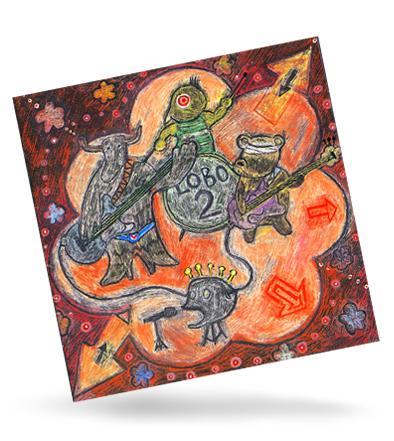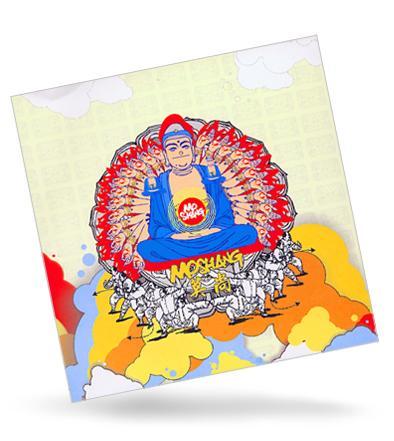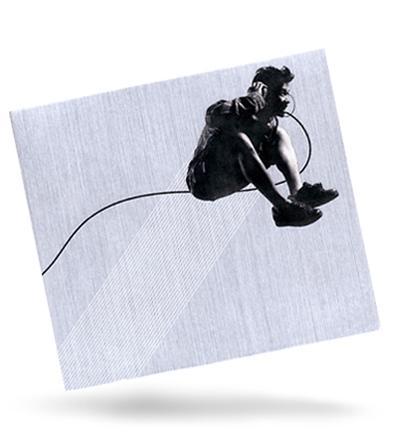Mo Shang (莫尚)
Made in Taiwan

Various
Onse P1ate

Mo Shang
When Jean Marais moved to Taichung two years ago, he figured that the quickest way to get to grips with the unfamiliar city sounds was to take to the streets with his mini-disc player and record everything he heard.
Having amassed several hours of the city's most vibrant sounds, Marais then decided to take his folly to the next level and record an album featuring an eclectic mix of some Taichung sounds and electronica.

Tripoets
Entitled Made in Taiwan (

XL
The fusion of street sounds, which range from the clatter of traffic to the hum of monks chanting and the reverberation of a public karaoke performance, with samples of Oriental instrumentation and ambient world beat-based electronica make Made in Taiwan an enticing listen and, thanks to Marais's studio smarts, one that never misses a beat.
His ambient creations might seem a bit over the top; but Marais isn't out to make a statement he's simply out to entertain. And regardless of theme, be it a funeral, dragon boats or learning Mandarin, all of the tunes are fresh, tight and, most importantly uncluttered. If it's simplistic, yet original localized chill-out you crave then, Made in Taiwan is not a bad place to begin.
Made in Taiwan is currently only available online from the websites www.soundclick.com/mosheng and www.cdbady.com/cd/mosheng.
Various
Lobo 2 (蘿蔔二代)
White Wabbit (小白兔)
The second compilation album from local indie label White Wabbit, Lobo 2 (
The double CD is divided into two parts. CD1 is dubbed "Pure and Fresh Ballads" (
While band's like Nipples (
Some of the album's most memorable moments include Freckle's (雀斑) lo-fi feel-good bubble gum pop tune Softly, Green Eyes Velvet Underground mixed/post-rock soaked In Your Room, Banana Brave's (香蕉勇士) wonderfully rudimentary 1980s styled slice of electronica-cum-surf music Electronic Sensitivity, Peppermint's (薄荷葉) jerky and hypnotic folksy number Old Wang (老王頌) and Xien's (仙樂隊) Willy Girl, which is a rough and ready number on which the band creates a hybrid blend of early Wall of Voodoo and the Gang of Four.
Tripoets (參劈)
Mixtape (聽說)
Flood Records (褔樓)
One of the growing number of underground rap groups currently kicking up a racket in club land, the Tripoets (
The combo's underground standing means that the album certainly won't reach the number one slot in local music charts, but the material is tight, the backing music exceptional and ill Mo (
The album does have its archetypal trash rap moments, but for the most part the trio doesn't attempt to sound like it grew up in a North American ghetto, nor does it fill all its tunes with potty mouthed vulgarities. Even if you don't particularly like rap it's almost impossible to find fault with the Tripoets predominantly nonvolatile style of rap.
Waxing, or rather rapping lyrical about education, youth culture and life as they live it to a backdrop of vibrant and agreeable backing music ranging from acid jazz to soul, reggae and, of course, more traditional hip-hop vibes, Mixtape (
XL
XL (特大號樂團)
Click Music (典選音樂)
After almost four years on the low reaches of the local alternative music scene, nu-metal/hip-hop five-piece combo, XL finally made its mark last year when it featured large at many of 2003's outdoor festivals and became a fixture at some of the nation's leading alternative/indie venues.
The band's vinyl debut EP, Prepare to Jump (
Unlike nu-metal peers, Monkey Insane (
XL's listener-friendly style of play may not appeal to the more hardcore nu-metal set, but its musical smarts and aptitude to toy with a tried and tested format means that XL probably has a promising musical future if it ever decides to aim for the mainstream and create non-youth culture oriented sounds.

President William Lai (賴清德) yesterday delivered an address marking the first anniversary of his presidency. In the speech, Lai affirmed Taiwan’s global role in technology, trade and security. He announced economic and national security initiatives, and emphasized democratic values and cross-party cooperation. The following is the full text of his speech: Yesterday, outside of Beida Elementary School in New Taipei City’s Sanxia District (三峽), there was a major traffic accident that, sadly, claimed several lives and resulted in multiple injuries. The Executive Yuan immediately formed a task force, and last night I personally visited the victims in hospital. Central government agencies and the

Australia’s ABC last week published a piece on the recall campaign. The article emphasized the divisions in Taiwanese society and blamed the recall for worsening them. It quotes a supporter of the Taiwan People’s Party (TPP) as saying “I’m 43 years old, born and raised here, and I’ve never seen the country this divided in my entire life.” Apparently, as an adult, she slept through the post-election violence in 2000 and 2004 by the Chinese Nationalist Party (KMT), the veiled coup threats by the military when Chen Shui-bian (陳水扁) became president, the 2006 Red Shirt protests against him ginned up by

As with most of northern Thailand’s Chinese Nationalist Party (KMT) settlements, the village of Arunothai was only given a Thai name once the Thai government began in the 1970s to assert control over the border region and initiate a decades-long process of political integration. The village’s original name, bestowed by its Yunnanese founders when they first settled the valley in the late 1960s, was a Chinese name, Dagudi (大谷地), which literally translates as “a place for threshing rice.” At that time, these village founders did not know how permanent their settlement would be. Most of Arunothai’s first generation were soldiers

Among Thailand’s Chinese Nationalist Party (KMT) villages, a certain rivalry exists between Arunothai, the largest of these villages, and Mae Salong, which is currently the most prosperous. Historically, the rivalry stems from a split in KMT military factions in the early 1960s, which divided command and opium territories after Chiang Kai-shek (蔣介石) cut off open support in 1961 due to international pressure (see part two, “The KMT opium lords of the Golden Triangle,” on May 20). But today this rivalry manifests as a different kind of split, with Arunothai leading a pro-China faction and Mae Salong staunchly aligned to Taiwan.